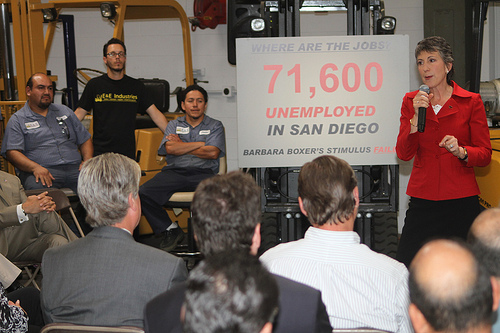
Good evening. It’s going to be short tonight, because I don’t actually have anything new to say about G—– or F— P—- tonight, as against freedom as they both are.
But I will say this about Net Neutrality: competition from new technology is the way out of any problems we have with the ISP monopolies and duopolies that state and local regulators cram down our throats. It’s not theoretical, either: Sprint is deploying 4G WiMAX service over more and more of the country.
Technology, not Net Neutrality regulation, is what we need.
Continue reading »

I hide nothing from you: I kicked back this Friday night. I slacked off. Now it’s Saturday at 2am and I’m finally getting to this. But, you all read this in the morning anyway so it really doesn’t matter much, right? (If I’m wrong I’ll surely hear in the comments)
Let’s start with a widely reported but badly reported story: DNSSEC. This is a framework for the Domain Name System (the framework for translating from hostnames such as www.redstate.com to IP addresses, which are the actual addresses used on the Internet). The system is akin to SSL for domains. Verisign will manage it for the Commerce Department and create a single “Root Key” which is then used to create certificates for domains, which will then be used to make sure your a domain’s DNS records are legitimate.
In my estimation, it’s just a big boondoggle for [Verisign] to get more customers. The vast majority of domains won’t be able to be secured by it, because Verisign is going to have a monopoly and will charge accordingly. This will only affect big businesses transacting large amounts of money, and they’re already secured against DNS-based attacks. If they’re smart they are, anyway.
What DNSSEC does that is bad, however, is create a new point of failure for the Internet, because there are 7 key holders which control escrowed access to the root key. If 3 of them lose the keys, the entire system will have to be re-keyed at expense and inconvenience to all, as pointed out by George Ou.
Continue reading »
In the year 2167, Stellvia (宇宙のステルヴィア) warns us that the Earth will be impacted by a great electromagnetic storm and take severe damage, which sets up the later 189 year Great Mission to save humanity from total annihilation. It turns out the fictional timeline may not be too far from the real thing, judging by this astronomical report.
Continue reading »

Good evening. Sure, it’s technically morning, but when I went to post tonight I realized I had nothing queued up to write about, so I had to make a crash run through my news feeds before I could get started.
But get started we shall tonight with Apple and the Library of Congress. The Library of Congress is apparently entrusted with setting rules for what forms of reverse engineering are allowed under the Digital Millennium Copyright Act, a landmark bill which included (over)broad restrictions on software. In short, the DMCA pretty much bans reverse engineering or circumvention of software or hardware that enforces copyright. Exceptions are given though, and the Library of Congress has announced some more exceptions.
One of them is a doozy: Both major forms of Apple iPhone “jailbreaking” are now expressly legal in this country. It is allowed to circumvent Apple’s restrictions to install legitimate software otherwise inaccessible through the App Store. It is also allowed to buy a used iPhone and circumvent the AT&T carrier restriction in it.
In practice this might not mean much, as jailbreaking activity was already strong due to clear legality in other countries from the start. That fact forced Apple to fight jailbreaking technologically, rather than legally. But now the full might of American engineering may be brought to bear on iPhone jailbreaking, and Apple might have a tougher time going forward.
Continue reading »

It’s Friday evening, and mentally I’ve almost checked out for the weekend, but I still have a lot to get through here, so let’s get going before I zone out with some Horatio Hornblower (a series I’ll start on this weekend thanks to a neat site called Age of Sail).
One big story is that Amazon may be trying to broker a Net Neutrality compromise. Amazon is, like Google, an Internet firm that stands to benefit greatly if ISPs are pounded into the ground by the FCC. But, as Amazon’s Paul Misener points out, “there have been almost no Net neutrality violations.” So Misener suggests, to cram his full piece into a few words as best as I can, that Internet routing be allowed to be more flexible and yes, payment enhanced, as long as everyone gets a shot at it. Fairness does not demand a socialist leveling of everyone onto the lowest common denominator of service.
It’s good to see at least some Net Neutrality proponents understand the way the Internet works both as a business as well as a technology, and can cut through the socialist ideology to start proposing reasonable compromise. I hope to see more talk of this nature.
Continue reading »

Good evening. Once again we see shoddy thinking from the FCC as they continue the push for the National Broadband Plan. Not all Americans have equal access to high speed Internet connections they complain, ignoring the fact that some Americans choose to live out in the middle of nowhere, and that choice comes with costs.
Chairman Julius Genachowski and the rest of his socialist team on the FCC don’t care, and just want to pass those costs onto the rest of us, it sounds like. Watch out as they try to declare a right to a good Internet connection, even if you’re off in the hills.
Continue reading »

